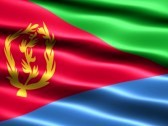OUR SPECIAL CORRESPONDENT
m.r.
Asmara, September 26th 2002
Wearisome march performed under a burning sun, amid poisonous spiders and snakes is what the young girls that the Government in Asmara mops up can expect to do for 18 months. To be near the mark, however, the reality is more dreadful. As a matter of fact, they are actually made to wait upon male solders, particularly military officers, for 12 hours per day and during the night they are used as slaves. For them, the only way out of this situation is to have a baby from a stranger while in service.
Midnight had just elapsed. Lula woke with a start following a bossy kick delivered by a rifle butt at her house’s door. Thus terrorized, she dashed out of her bed immediately. The soldiers surround a dilapidated two-floor building near the airport of Asmara. The girl quickly inserts a pant and a jacket, and before opening the door she turns a rapid look toward the desperate eyes of her mother. The officer, placed at the main door, snarls some sentence toward the women.
Lula hasn’t got the “menqesaqesi” (the military travel permit”). A man catches her violently by the arm and drags her to a truck already full of frightened boys and girls. In a few seconds the truck disappears in obscurity. Their destination is Sawa.
Sawa is an extremely severe and unapproachable military training camp situated in the red-hot desert near the border with the Sudan. The young Eritrean girls call it more simply “the rapes camp”. But they can whisper this only in your ear.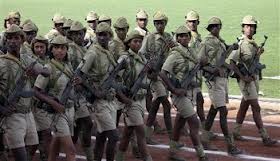
Sooner or later everybody is bound to go through Sawa. All the Eritreans between the age of 17 and 40 are obliged to go to Sawa. But, often, also teen-age boys and girls end up in it. The figures are spine chilling: it is calculated that over 200 thousand Eritreans, half of which women, have been recruited by force.
Lula started attending Sawa in January 2001. She is just 17 years old. She has left school in 1998 in order to look after her younger sister. Abandoned by the husband, her mother is a cardiopathic. It is now two years since she last heard from her two elder brothers. Most probably they perished, like the other 19 thousand youth (officially) declared dead, during the foolish war waged against Ethiopia in 1998.
For Lula the six months spent in that bloody camp are still a nightmare. She recalls: “At the beginning it was simply a torture. In silence, I put up with enervating marches in the desert, amid spiders and snakes, under a blinding sun that breaks your legs. I wanted to demonstrate to the “bosses“ that I am a good patriot. The suffering started 4 months later, when I was too tired to rebel.
Everyday, at the sunset, the male officers used to enter bossily inside our tents to choose one of us in order to spend the night with her. These officers, although duly married, considered it normal to go to bed every night with a different female solder. Very soon I got pregnant and as a result I was immediately sent back home”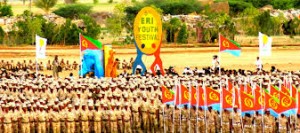
The dramatic experience made in Sawa has meant for the young mother the abandonment of every hope in the future. “The government’s propaganda promises jobs to the youth completing the obligatory military service. But this is not true. Besides, the wage is only 150 nakfa per month more or less the equivalent to 7,5 euro at the black market. They prevent us from studying and by doing so they steal from us the capacity to have and realize our dreams. I do not know how, without a husband, I will be able to feed Stella once I am finished nursing her. One thing is certain, however. When her turn to go to Sawa comes, I will hide her. I will never allow my child to go to Sawa”.
Some catholic nuns, secretly, run a clinic for ex female solders. A lot of families refuse to welcome home the single mothers or the fugitives from Sawa. As a result, the nuns are the only bosom-friends of the young women thus traumatized or about to give birth to children conceived in military camps. “The situation is by now uncontrollable – declares a nun -. A lot of women marry ‘perfect strangers’ in order to avoid the ‘giffa’ (the forced roundaps). Some others cannot hold out and commit suicide. Ever since the government has decided not to recruit women with children anymore, our clinic is full of pregnant girls waiting to deliver the children they got from strangers. They then return in a desperate mood when they realize that without the military membership card they will never have a job. The future of this country is bleak, indeed”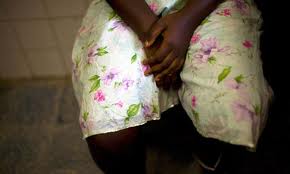
Elsa, on the other hand, has completed her 18 months of military service. 12 of which near Assab: right in the middle of the hellish Dankalia desert. She shows faded photos of Sawa while proudly training in her uniform and smiling. “It was in 1998. I was 20 years old. After 6 months I realized the soldiers were expecting from me a different kind of ‘service’. My 17 years-old companion and I were made to settle in a house already occupied by male solders”, whispers Elsa. “In practice we had become theirs slaves. As a matter of fact, during the day we had to work for them for 12 hours and by night we were raped. It was simply an unbearable torment. I was fortunate enough to be chosen by an unmarried man. At the beginning I was happy, but he sent me back home in Asmara when I got pregnant. Luckily, this had happened 2 months before the burst of the war. Otherwise I would have been killed at the war front. The officer wrote to me a letter to disown the fatherhood of the child I was about to deliver. I know that in the meantime he had married another girl. A lot of my companions suffer from AIDS. We know about the existence of this disease, but I personally do not know well how one gets it”.
The spread of HIV virus in Eritrea is alarming. Only one case was reported in 1988. But in 2001 there were over 13 thousand patients. It is now growing at a rate of 3 thousand new victims every year.
The war between Eritrea and Ethiopia is by now over. 3500 peacekeeping solders of the United Nations, including 150 Italians, are making sure the ceasefire holds. President Isayas Afewerki had solemnly promised to demobilize around 150 thousand soldiers. The World Bank had allotted money for their studies and professional activities. Today, nobody speaks about this project anymore. Lurking at the street-corners, every night, teen-age solders wearing mimetic overall and sandals, order their same age groups to exhibit the hated “menqesaqesi”. Whoever is found without it, s/he is immediately sent to Sawa.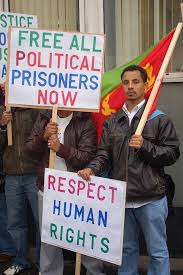
It is forbidden to speak of such thing as forced recruitments. The government prefers to calls it “summer work programs” or “maetot”. Beginning from June of this year combings have intensified. So much so that on Tuesday night of July 9 alone 3 thousand people were mopped up. In the evening the city of Asmara is almost desert. The young people that attend cafe and restaurants are only the Eritreans residing abroad who return home to spend the summer vacations. They are affectionately called by the population: “Beles” (“prickly pears”). In order to dodge round the forced recruitments the girls spend the night everyday in a different place. Or, as it is the case with those of them working in hotels, are hidden in the wine cellars of the same hotels duly equipped of mattresses and water. But, often, this is not enough. As a matter of fact, the army officers go directly to the employer to demand the hand over of his employees.
The raking system has provoked the paralysis of the economy and, as a result, a lot of enterprises have closed down. Should a water-tap drip, there are no plumbers to repair it; the arable land is neglected because there are no hands; the Ministry of Education was forced to hire 300 Indian teachers because the Eritrean teachers have either disappeared on the front or are sent to Sawa. President Isayas has never promulgated the 1997 Constitution. He ordered, instead, the arrest of 15 of his closest and experienced collaborators. They are jailed in a secret place. Their only fault was to have dared to write a letter asking for long awaited democratic reforms.
The free press has been suppressed and the journalists imprisoned. 400 university students who opposed the government’s “Summer Work Programme” have been sent to Wi’a with the assignment to pile up stones. Wi’a is a lager next to the seaport of Massawa where the temperature often exceeds 40 degrees. The other 1700 students too have been prevented from registering for the new academic year because blocked by the endless compulsory military service. To speak openly of the political and social situation of the country is impossible. As in the ’70 and ’80, fleeing the country has restarted. For example, to lot of women are escaping on foot to Ethiopia and the Sudan but also to other countries reachable by sea. Those who can pay are brought to the seacoast and made to settle down in a small boat in the middle of the Red Sea while waiting for a bigger boat or ferry in rout towards Europe to arrive. Others fall victims of swindlers without scruples.
In Eritrea the bonds with Italy are still very strong. A lot of Eritreans, including some young people, speak perfectly our language. Asmara gives hospitality to the most important Italian school abroad and its architecture (of the ’20) as well as the atmosphere one breathes is similar to that of a calm and drowsy city of south Italy. One evening I was in a restaurant. There, I met an Eritrean man of about fifty years old. In front of him there was a dish of steaming hot “tagliatelle” with meat sauce.
Although with some embarrassment, he volunteered to speak about his daughter. “She is 20 years old. She has completed the Italian school 2 years ago. Her grandmother, i.e. my mother, too was an Italian. She should have left for Sawa by now, but I got some false documents for her according to which it turns out to be still too young to go to Sawa”. What about going abroad? “It is impossible! No passport without the military enrolment card. The government has annulled all the scholarships too, because many students never return home. In the evening she doesn’t go out and the whole family is hiding her in order to avoid being sent to that aberrant military camp. But in this small country with about 3 and a half million inhabitants, there are no so many places left for hiding oneself”.
m. r.
This article was written in 2002 but is still up to date
Questo articolo si può leggere anche in italiano

